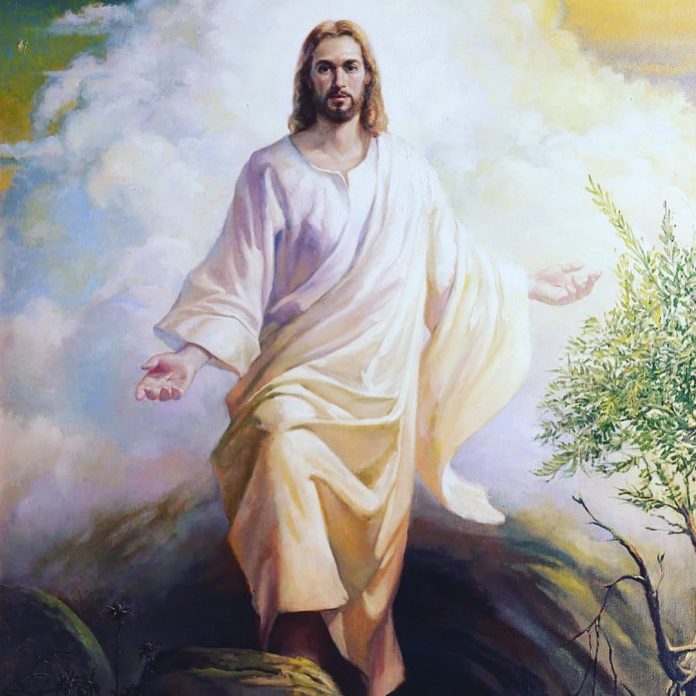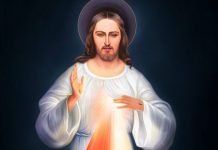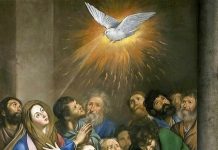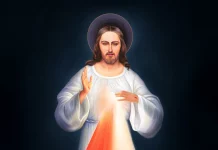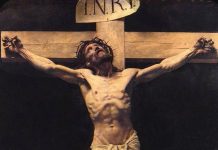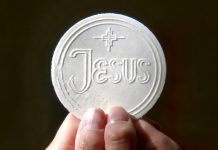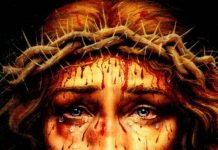Let us start with a passage from the letter to the Hebrews. ‘Therefore let us go on toward perfection, leaving behind the basic teaching about Christ, and not laying again the foundation: repentance from dead works and faith toward God, instruction about baptisms, laying on of hands, resurrection of the dead, and eternal judgment’ (Heb 6:1-2). The authentic teaching of the Church in subjects like repentance, faith, baptism, laying on of hands, resurrection of the dead, and eternal judgment are considered elementary. Any catholic worthy of the name should be thorough with these aspects of faith.
Still we see many around us who doubt these basic tenets of Christianity. This should be viewed from a wider perspective of the looming apostasy that is threatening the foundations of our collective identity as Christians and ultimately endangering our salvation. The confusion regarding such elementary aspects of our faith is more glaring when it comes to the resurrection of the dead. Though the teaching of the Church is crystal clear, many doubting Thomases still remain. They need proof for even the absolute truth. Sadly, it is hard to come, not because there is any dearth of evidence, but because their hearts are not open to receive the truth. Obstinately continuing with one’s doubting nature will get him nowhere. James writes; ‘For the doubter, being double- minded and unstable in every way, must not expect to receive anything from the Lord’ (Jas 1: 7-8).
The Word of God is not for the doubter, but for those who ‘hear the Word, hold it fast in an honest and good heart, and bear fruit with patient endurance’ (Lk 8:15). It is the devil himself who sows the seeds of disbelief in the hearts of the faithful. Being engaged in a fierce battle for the ultimate control of human souls, the devil employs this clandestine instrument of doubt to deceive the children of God. The devil often comes to us not for a head-on engagement. Patience is one thing that he values very much. Perhaps the devil is the person who practices the virtue of patience more than any of us. He is ready to wait till the final harvest. But he has already done his part by sowing the seeds of doubt into our souls. He knows for sure that this seed of disbelief will grow with time and will once become a big tree.
As far as God’s relation with us mortals are concerned, the devil has no dispute with God except for the eternal bliss He has reserved for His children. The devil is jealous towards us because we are made heirs to this great inheritance, which he forfeited with his pride and disobedience. We receive our eternal reward once we rise again after death. A natural death of our body and its supernatural resurrection is essential to enter the kingdom of eternal glory. Hope in this resurrection is what binds us to Jesus Christ, who is the only person in history who has risen from the dead. It is his promise that whoever believes in the Lord, who himself is resurrection and life, will inherit eternal life. Before raising Lazarus from the dead, Jesus taught this cardinal rule of eternal life to Martha. Jesus said to her: “I am the resurrection and the life. Those who believe in me, even though they die, will live, and everyone who lives and believes in me will never die” (Jn 11: 25- 26).
Our faith in the resurrection of our body has its roots in what our Lord said. We do not need external evidence to substantiate the existence of life after death. If Jesus rose from the dead, he will raise us also from the dead. But for the doubter it is a big ‘if’, because it has not gone deep into his heart that Jesus did rise from the dead. If we do not believe in the resurrection of Jesus Christ, it is impossible to believe that one day we also will be raised.
What should be elementary to our faith viz the teaching about the resurrection of the dead, has been a source of confusion, purely because the devil has effectively used our own lack of faith in the resurrection of our Lord so as to inject into us the falsity that there is nothing beyond life. If there is nothing beyond life, then our faith is in vain, says Paul. ‘If there is no resurrection of the dead, then Christ has not been raised; and if Christ has not been raised, then our proclamation has been in vain and your faith has been in vain’ (1 Cori. 15:13-14). It is such a basic teaching that the lack of faith in it makes everything else we do in the process of evangelization become futile.
If we are proclaiming a gospel sans resurrection of the dead, we are living for this life only about whom Paul says; ‘If for this life only we have hoped in Christ, we are of all people most to be pitied’ (1 Cori 15:19).
It is elementary, my dear Christians. It is sad to remind Christians again and again about this cardinal part of our faith. But often we have to do it because the spirit of this world has permeated their minds to such an extent that they started believing every falsity at the cost of the revealed truth.
The belief in resurrection was so strong in the early Church. In his letter to the Corinthians, Paul mentions the practice of receiving baptism on behalf of the dead. ‘Otherwise, what will those people do who receive baptism on behalf of the dead? If the dead are not raised at all, why are people baptized on their behalf? (1 Cori 15:29).
Now if you simply buy the argument that there is no resurrection for the dead, you are no better than atheists and materialists, because for them life is for this world only and they value the pleasures of this life more than anything else. Paul warns us against the risk of falling for this kind of misguided teachings that proclaim the false gospel of material pleasure; ‘If the dead are not raised, ”Let us eat and drink, for tomorrow we will die.” (1 Cori. 15:32).
One starts to doubt the possibility of resurrection when his knowledge about the scriptures and the power of God becomes inadequate. Jesus himself once said this to the Sadducees, who did not believe in resurrection. “Is not this the reason you are wrong, that you know neither the scriptures nor the power of God?” (Mark 12:24). It follows that any person having gone through the Scripture should be able to assert his belief in resurrection of the dead. It is a plain and undeniable truth. See how Jesus clears the air in the matter. “And as for the dead being raised, have you not read in the book of Moses, in the story about the bush, how God said to him, ‘I am the God of Abraham, the God of Isaac, and the God of Jacob’? He is God not of the dead, but of the living; you are quite wrong.” (Mark 12: 26-27).
We believe in a God who likes to be the God of the living. Do you think that such a God will let his children perish and disappear at the moment of death? No. This perishable life in this passing world is the precursor to a life everlasting in a kingdom that exists forever. God has sown the seeds of eternity in our mortal bodies and its harvest takes place after death at the time appointed by God for our transit to eternity. ‘What is sown is perishable, what is raised is imperishable. It is sown in dishonor, it is raised in glory. It is sown in weakness, it is raised in power. It is sown a physical body, It is raised a spiritual body. If there is a physical body, there is also a spiritual body’ (1 Cori 15:42-44). Everything about our faith in the resurrection of the dead is summarized in these words of Paul.
As you sow, so shall you reap. If you sow good things for the spirit, you will reap a good harvest in spirit. The thought that this body is to be raised again in glory should rule us at all times. We hope to achieve resurrection not by our merits but by our faith in the risen Lord. To be raised in the Lord, we should first die in the Lord. ‘For since we believe that Jesus died and rose again, even so, through Jesus, God will bring with him those who have died’ (2 Thes 4:14). It is not without reason that Christians describe death as falling asleep in the Lord. Death is but a short sleep after which we will open our eyes to a new dawn, in a new and hitherto unknown place.
None of us have first hand experience about life after death. But there are persons who have seen the risen Lord. Let us try to know how they felt when Jesus Christ appeared to them after resurrection. We are familiar with the picture of Mary Magdalene who stood weeping outside the tomb (Jn 20:11). She was pleading to get the body of Jesus. Jesus knew how deep was her commitment to him and it was no surprise that he blessed Mary Magdalene by appearing to her, even before he visited his beloved disciples. But the interesting part is that when Jesus appeared to her, Mary Magdalene could not recognize him. Mary, who was closely associated with Jesus, failed to recognize Jesus. Isn’t it surprising?
We get a clue to the answer on the way to Emmaus. Two of the disciples were traveling from Jerusalem to Emmaus. Somewhere down the road Jesus joined them, talked to them in length and entered their house with them. But they could not recognize him! It was when ‘he took the bread, blessed and broke it, and gave it to them’ (Lk 24:30) that their eyes were opened. They immediately returned to Jerusalem and told other disciples their experience. While the disciples were talking about this, Jesus himself stood among them and said to them, “Peace be with you” (Lk 24:36). ‘But they were startled and terrified, and thought that they were seeing a ghost’ (Lk 24:37). Looks strange indeed. None of the disciples could identify the person who wished them peace was the prince of peace! It needed a detailed explanation from the Lord to convince the disciples.
Then comes the encounter at the shores of Tiberias. Jesus was waiting for the disciples who were returning empty handed after a whole night’s toil. They could not recognize their Master even during daylight and even after hearing his words! They needed a miracle of a net full of fish to realize that it was indeed their Lord who was standing before them!
Why none of these persons to whom Jesus appeared after resurrection could recognize him? Because a resurrected body is different from a mortal body. Paul explains; ‘There are both heavenly bodies and earthly bodies, but the glory of the heavenly is one thing, and that of the earthly is another’ (1 Cori 15:40). A resurrected body is not like an earthly body. But to see and identify a heavenly body, we need eyes focused on heaven. As long as our eyes are focused on worldly things, it is impossible for us to experience the heavenly vision. This is exactly what happens to those who doubt the resurrection of the body. There is an earthly body. After death and at the time of resurrection, this earthly body assumes a whole new appearance in glory and becomes a heavenly body.
When we look at how the Bible describes the occasion of the last judgment, we will get more insight into the resurrection of the dead. ‘And I saw the dead, great and small, standing before the throne, and books were opened. Also another book was opened, the book of life. And the dead were judged according to their works, as recorded in the books. And the sea gave up the dead that were in it, Death and Hades gave up the dead that were in them and all were judged according to what they had done’ ( Rev. 20:12-13). We read that the sea has given up the dead that were in it so that they can be presented before the throne of judgment. Similarly, Death and Hades also will have to give up the dead so as to make their appearance before the just judge when called for.
The last enemy to be defeated is death (1 Cori 15:26) and this is accomplished in its perfect sense when the elect start life everlasting with their God. We call this the consummation of things, the consummation of time and history. Because at this point we return to the point from where we started our journey in history. In the Book of Wisdom we read; ‘God created us for incorruption, and made us in the image of his own eternity, but through the devil’s envy death entered the world, and those who belong to his company experience it’ (Wis 2:23-24). Now imagine God’s plan as a straight road extending infinitely to both directions and guaranteeing seamless movement. Life in this world – from the fall of man to the moment of last judgment – is a loop placed midway in the road, through which we have to pass for a short while and again enter the road at the same point where we left it and then continue our journey. A body was given to us just for the sake of making this short journey through the loop and once it is completed, it is logical for us to be given a ’new body’ because a mortal body is neither fit nor is it designed for a journey that extends till eternity. ‘Flesh and Blood cannot inherit the kingdom of God nor does the perishable inherit the imperishable’ (1 Cori. 15:50).
To enjoy life in an imperishable world, we need an imperishable body and it is given at the time of our resurrection. It is elementary, my dear Christians! Resurrection of our bodies will happen one day, and that day is closer than we think. But our eternal destiny in the new body depends on the seed that we sow and nurture in our earthly life. This is the importance of keeping our bodies holy. Let me conclude with a verse from the letter of Paul to the Romans; ‘I appeal to you therefore, brothers and sisters, by the mercies of God, to present your bodies as a living sacrifice, holy and acceptable to God, which is your spiritual worship’ (Rom12:1). Because this body is to be raised again!
Let us pray: Eternal Father who gives life to the dead, and existence to the inexistent, bless us with the grace to live in the faith that our bodies will be resurrected one day. May this conviction help us to present our bodies as a holy sacrifice acceptable to you. Amen.


